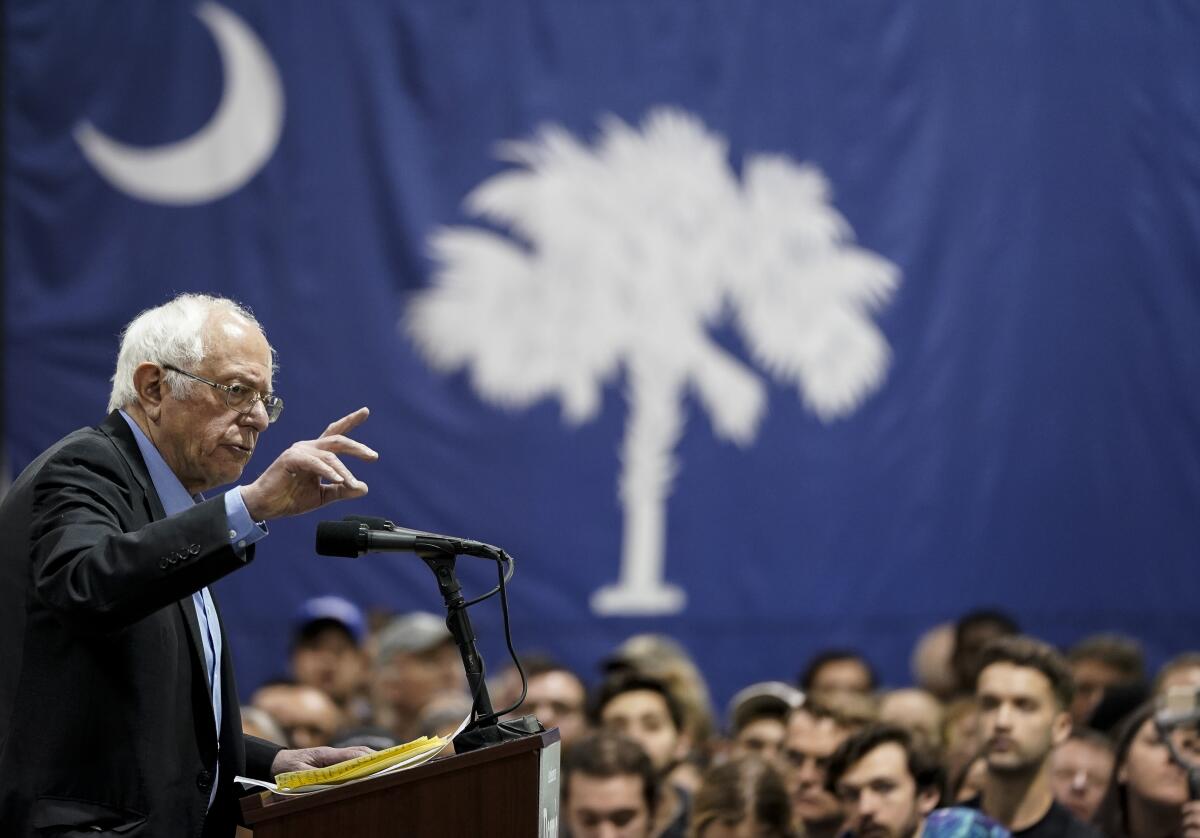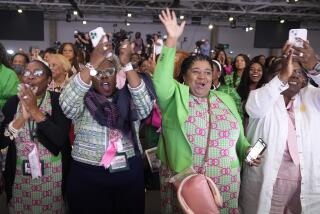Op-Ed: Black voters pragmatically support Biden to beat Trump — but we deserve Sanders’ big agenda

Joe Biden’s resurgence has been swift and unstoppable. From the cusp of irrelevance, he rocketed to the status of presumptive nominee as Super Tuesday I and II unfolded. His historic reversal of fortune was made easier by other candidates folding up their tents and lining up behind him. What was supposed to be a hard-fought battle with Bernie Sanders through the spring is looking like a rout.
Biden has black people to thank for the miracle. The outcome looks inevitable now, but the South Carolina primary, on Feb. 29, will be remembered as the point at which a fractured party first came to its senses about who could garner enough votes to beat Trump and stop the nation’s slide toward political Armageddon.
Just as in the civil rights movement, black people are the moral vanguard, clarifying our national purpose at a key moment and breaking a paralysis of consensus. The South Carolina message was clear: The racist must go. We must beat Trump, and we’ll beat him with Biden.
Biden was the loyal sideman to the first black president, Barack Obama, who gave rise to massive white resentment that Trump successfully harnessed in 2016. That alone was more than enough reason for many black voters to give Biden the go-ahead in South Carolina. What has happened next, Biden’s much-analyzed momentum, is the domino effect of black voters’ certainty.
This may all work out just fine as far as ending Trump’s reign, a goal that the coronavirus pandemic only makes more urgent. And yet the black certainty that will have saved us in the short term is a problem in the long term.
Black folk are too certain. We vote pragmatically. We vote not for the candidate who will do us the most good but for the one who will do us the least damage. We choose politicians who won’t create solutions for our many legitimate crises but who will put the brakes on the worst offenses that already exist. (Trump certainly qualifies as such an offense.) We don’t vote ideology because we usually can’t: United States history has been so hostile to black interests and racial equality that there usually aren’t mainstream candidates who truly represent the way we think, what we believe. Politically, black people have to be on the defensive — voting for what someone isn’t, not for what he or she is.
Voting defensively is not always a waste; in 2020, it has never felt more crucial. But the desperation fueling black defensiveness is obscuring something important. In 2020 we could be choosing ideologically at long last. Bernie Sanders mainstream candidacy, and its socialist-friendly agenda, addresses much of what black people prioritize, from ending mass incarceration to tackling homelessness. His campaign has proved that electoral politics can represent a deeply held belief system: ideology.
Sanders’ unwavering progressivism is also supposed to be his fatal flaw: He’s not practical or realistic. But where has realism gotten us? I think of Martin Luther King Jr.’s letter from Birmingham jail in 1963, which he wrote to white liberals — his putative civil rights allies — who were counseling patience and incremental change in the face of fierce Southern resistance. King was having none of it. For him, dramatic change was practical , demanding it was the only choice if segregation were to be defeated. Call that unrealistic and revolutionary, but it was utterly necessary.
In the decades since King’s death, many black people have lost touch with the necessity of idealism and imagination. They have forgotten that those are the only things that ever worked for us.
After South Carolina, the black vote — secured by the Voting Rights Act, one decidedly revolutionary thing King forced into law — was tracked from state to state, almost fetishized. The scrutiny was all about the horserace and how black folks might get Democrats across the finish line in November. Beyond the Obama connection, no one talked about Biden as a supporter of black voters’ interests.
No one mentioned the former senator’s troubling record on school busing (not even Kamala Harris, who famously took him to task on the debate stage last year, but who endorses him now) or how he cleared the way for Clarence Thomas’ retrograde hijacking of Thurgood Marshall’s seat on the Supreme Court, or how he embraced the Clintonian approach of talking empathetically about race and equality but tacking right in order to compete effectively with the white majority Republican Party. That strategy worked, but with black people as the biggest losers.
As for Sanders, the tenets of racial equality are baked into his agenda. He has weathered criticism from black people that, like most white progressives, he emphasizes economic problems over racial ones. But his ideology is worth our consideration. Another complaint is that he isn’t a Democrat, but that’s the point — in order to maintain his agenda, he can’t be. I heard a black man in a grocery store line loudly decrying Sanders’ socialism; I couldn’t help responding that government policies for and about the common good —socialism — have been the only thing that’s come close to helping black people on the scale we deserve to be helped.
I am not officially endorsing Sanders, a position that is almost moot. I am saying that black voters have the rare opportunity to consider the change his candidacy has offered and how that change could finally make the Democratic Party accountable to them, its most reliable and potent bloc.
But Democrats won’t be held accountable — again — because the overwhelming fear of a Trumpian future, intensified by the way COVID-19 painfully lays bare our crisis of national leadership, is making pragmatists of us all.
For black voters, pragmatism is familiar, a default position. But it should never be mistaken for all of who we are, or what we want.
Erin Aubry Kaplan is a contributing writer to Opinion.
More to Read
A cure for the common opinion
Get thought-provoking perspectives with our weekly newsletter.
You may occasionally receive promotional content from the Los Angeles Times.










